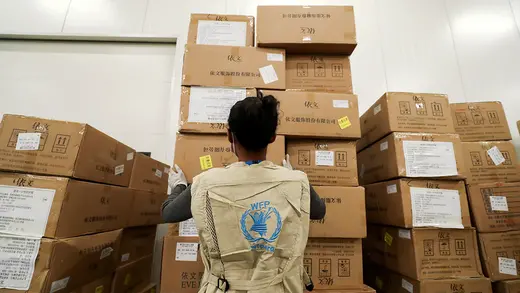In Brief
Will the Coronavirus Endanger Foreign Aid?
As the coronavirus pandemic increases the need for aid around the world, donors are facing tough choices over whether to continue helping vulnerable populations abroad or focus their attention at home.
The pandemic of a new coronavirus disease, COVID-19, has caused the worst humanitarian crisis since World War II, experts say, spurring calls for increased aid worldwide. But with countries focusing on their own outbreaks and economic turmoil, they could hesitate to contribute more abroad, potentially allowing the virus to take hold in vulnerable communities.
Have countries increased foreign aid amid the coronavirus?
So far, many wealthy countries have heeded the United Nations’ call to boost their contributions to respond to the coronavirus crisis. By April 24, the World Health Organization (WHO) had received more than half of the $675 million needed for its coronavirus response plan. The United States has contributed $30 million, making it one of the largest donors, though this was exceeded by Japan’s $47 million and Kuwait’s $60 million contributions. Additionally, UN Secretary-General Antonio Guterres asked for contributions to a $2 billion emergency relief plan, which was nearly 35 percent funded as of April 24 and will provide testing and medical equipment to the world’s most vulnerable populations.
In some cases, the pandemic has encouraged cooperation among countries. China has offered masks and testing kits to international organizations and hard-hit countries across Europe and Africa, though some countries have rejected Chinese equipment that was found to be defective. Russia sent a plane full of personal protective equipment (PPE) to the United States in addition to sending aid to Italy and Serbia. Meanwhile, South Korea and Taiwan have sent testing materials and more than sixteen million masks to countries in the Americas, Asia, and Europe.
How has the world’s focus on the coronavirus affected other aid?
More on:
Experts warn that provisions to other emergencies could decrease or halt altogether. Border closures have hampered the efforts of international aid groups that are struggling to maintain current programs while also battling the coronavirus. Organizations may be forced to pull their staff and volunteers from the front lines over fears that they could be exposed to the virus. UN officials say that wealthy countries that typically donate millions could also cut foreign aid if their outbreaks worsen or as their economies near collapse because of coronavirus lockdowns.
What’s the status of U.S. aid programs?
President Donald J. Trump has repeatedly called for cuts in foreign aid since taking office. In its 2021 budget proposal, his administration reportedly requested a 21 percent reduction in foreign aid, including cuts to global health programs.
In April, the administration halted U.S. funding to the WHO, citing claims that the organization covered up the spread of the coronavirus. U.S. donations accounted for about 15 percent of the WHO’s budget in 2018. U.S. Agency for International Development (USAID) programs have been interrupted amid confusion over whether it was authorized to provide protective gear and other coronavirus-related aid to other countries. Additionally, international programs such as the Peace Corps have been suspended out of concern for volunteers’ safety and health, and overseas diplomats have been encouraged to return to the United States.
At the same time, the State Department and USAID pledged $274 million in international aid to combat the virus in sixty-four countries. As part of that package, the United States sent $40 million to Middle Eastern and North African countries and $2 million to Thailand, in addition to funds sent to other Southeast Asian nations.
What’s at stake if aid declines?
Many communities at high risk of experiencing outbreaks are besieged by other issues and already dependent on international assistance. The UN World Food Program has warned that famines of “biblical proportions” could occur within months if action is not taken to secure aid access to conflict zones. The Horn of Africa is suffering an unprecedented locust invasion and subsequent crop failures, while war continues to ravage Syria and Yemen. Additionally, countries across Africa and Latin America, many with already fragile economies, are in need of more health-care professionals and supplies such as ventilators and masks.
More on:
A decline in aid could make such countries even more susceptible to the pandemic, experts warn. Also at risk are refugees and displaced populations, who are “particularly vulnerable to the virus, because in overcrowded camps, distancing is impossible, and residents lack access to information, soap, and clean water,” Megan Doherty, senior director of policy and advocacy at the global aid group Mercy Corps, tells Foreign Affairs.
Experts worry that pulling aid away from these host spots will ultimately be counterproductive, as failing to deal with the outbreak in these areas could potentially lead to a resurgence of the virus around the world.
 Online Store
Online Store
